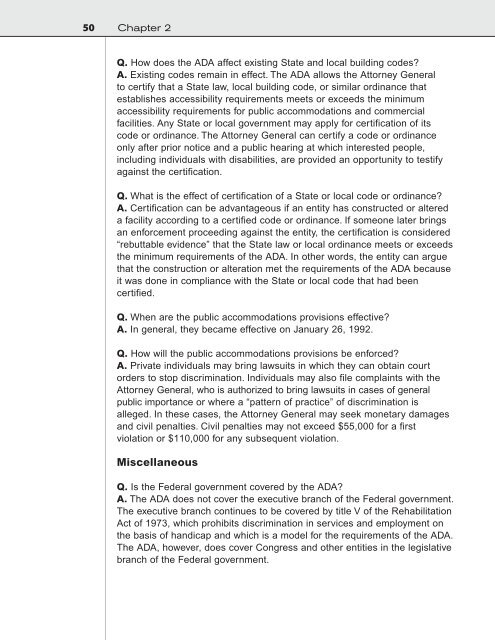Design for Accessibility: A Cultural Administrator's Handbook
Design for Accessibility: A Cultural Administrator's Handbook
Design for Accessibility: A Cultural Administrator's Handbook
You also want an ePaper? Increase the reach of your titles
YUMPU automatically turns print PDFs into web optimized ePapers that Google loves.
50 Chapter 2<br />
Q. How does the ADA affect existing State and local building codes?<br />
A. Existing codes remain in effect. The ADA allows the Attorney General<br />
to certify that a State law, local building code, or similar ordinance that<br />
establishes accessibility requirements meets or exceeds the minimum<br />
accessibility requirements <strong>for</strong> public accommodations and commercial<br />
facilities. Any State or local government may apply <strong>for</strong> certification of its<br />
code or ordinance. The Attorney General can certify a code or ordinance<br />
only after prior notice and a public hearing at which interested people,<br />
including individuals with disabilities, are provided an opportunity to testify<br />
against the certification.<br />
Q. What is the effect of certification of a State or local code or ordinance?<br />
A. Certification can be advantageous if an entity has constructed or altered<br />
a facility according to a certified code or ordinance. If someone later brings<br />
an en<strong>for</strong>cement proceeding against the entity, the certification is considered<br />
“rebuttable evidence” that the State law or local ordinance meets or exceeds<br />
the minimum requirements of the ADA. In other words, the entity can argue<br />
that the construction or alteration met the requirements of the ADA because<br />
it was done in compliance with the State or local code that had been<br />
certified.<br />
Q. When are the public accommodations provisions effective?<br />
A. In general, they became effective on January 26, 1992.<br />
Q. How will the public accommodations provisions be en<strong>for</strong>ced?<br />
A. Private individuals may bring lawsuits in which they can obtain court<br />
orders to stop discrimination. Individuals may also file complaints with the<br />
Attorney General, who is authorized to bring lawsuits in cases of general<br />
public importance or where a “pattern of practice” of discrimination is<br />
alleged. In these cases, the Attorney General may seek monetary damages<br />
and civil penalties. Civil penalties may not exceed $55,000 <strong>for</strong> a first<br />
violation or $110,000 <strong>for</strong> any subsequent violation.<br />
Miscellaneous<br />
Q. Is the Federal government covered by the ADA?<br />
A. The ADA does not cover the executive branch of the Federal government.<br />
The executive branch continues to be covered by title V of the Rehabilitation<br />
Act of 1973, which prohibits discrimination in services and employment on<br />
the basis of handicap and which is a model <strong>for</strong> the requirements of the ADA.<br />
The ADA, however, does cover Congress and other entities in the legislative<br />
branch of the Federal government.


